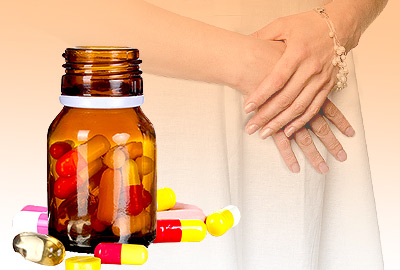There's nothing sexy about vaginal dryness. While dryness can occur at any point in a woman's life, it is particularly common during perimenopause, when hormonal imbalances cause the vaginal tissues to become thin and secrete less moisture. Itchy and uncomfortable dryness often causes painful friction during sexual intercourse, making it the ultimate anti-aphrodisiac. When sex is painful, it's inevitable that your libido will be affected.
Should I Give up on Having Sex?
Absolutely not. Sex is a natural expression of affection and attraction. It's both physically and emotionally stimulating, stress-relieving, and satisfying, and a vital means of expressing intimacy with your partner. Sex is also a natural antidote to dryness; when a woman becomes aroused, blood circulation to her vaginal tissues increases, which stimulates the secretion of moisture there. Regular sex also improves muscle tone in the vagina, strengthening the tissues and promoting sound vaginal health.
Problematically, of course, painful intercourse may make the idea of sex off-putting.
Practical Solutions
The physical changes during menopause may slow your physical reaction times, so set aside ample time before having sex to give you time to become fully aroused. Try incorporating a water-based lubricant into foreplay to enable penetration that's comfortable and pleasurable as opposed to abrasive and painful. In fact, chamomile gel can relieve painful sex and increase sexual satisfaction.
Try to view sex as an opportunity to explore and enjoy one another's bodies rather than focusing on the end goal. Mutual masturbation, caressing, oral stimulation, and kissing are sexually intimate and will increase your arousal without pain. Masturbation will also stimulate the regular production of moisture in the vagina and improve vaginal muscle tone and blood flow, helping to combat dryness.
Talking to Your Partner
Remember that your sex life is something that affects your partner as well as yourself, so it's vital to communicate with them to avoid misunderstandings, frustration, and tension within your relationship. Choose a moment outside of the bedroom to discuss the positive and negative aspects of your sex life. Be open, honest, and loving, and encourage your partner to express their thoughts, too. Ask for your partner's support as you treat your dryness, and encourage them to view this as an opportunity to explore new sexual possibilities together, such as mutual masturbation or oral sex.
Small alterations to your diet, habits, and lifestyle outside the bedroom could also reduce your vaginal dryness, making things less painful inside the bedroom. It's important to make time for your sex life for your physical and emotional well-being; sex is a wonderful, natural process that everybody deserves to enjoy, and there's no reason for you to miss out on the joys of sex because of vaginal dryness.
Sources
- Avicenna Journal of Phytomedicine. (2020). Evaluation of the influence of chamomile vaginal gel on dyspareunia and sexual satisfaction in postmenopausal women: A randomized, double-blind, controlled clinical trial. Retrieved November 23, 2020 from https://www.ncbi.nlm.nih.gov/pmc/articles/PMC7508318/
- Better Health Channel. (2013). Menopause and sexual issues. Retrieved April 8, 2014, from http://www.betterhealth.vic.gov.au/bhcv2/bhcarticles.nsf/pages/Menopause_and_sexual_issues
- Food and Drug Administration. (2014). Menopause and Hormones Common Questions. Retrieved April 8, 2014, from http://www.fda.gov/forconsumers/byaudience/forwomen/ucm118624.htm
- National Health Service UK. (2012). Sex after the menopause. Retrieved April 8, 2014, from http://www.nhs.uk/livewell/women4060/pages/sex-after-the-menopause.aspx
- Office on Women's Health. (2010). Menopause and sexuality. Retrieved April 8, 2014, from http://womenshealth.gov/menopause/menopause-sexuality/




